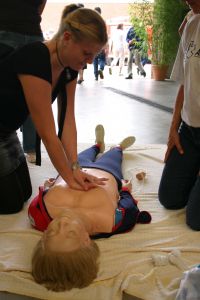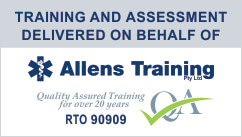Northern Beaches, Sydney, one day First Aid course. DRSABCD – CPR guidelines have changed.
Any attempt at CPR is better than none at all !

‘If people are unwilling or unable to do ventilations, they should at least do chest compressions.’
17/03/2011- Revised national resuscitation guidelines highlight the need to get help as soon as possible, perform compressions before ventilations and give quality cardio-pulmonary resuscitation.
Issued by the Australian Resuscitation Council, the revised guidelines reflect recent scientific evidence that has been evaluated and published by the International Liaison Committee on Resuscitation.
Council chairman, UWA Winthrop Professor Ian Jacobs said getting help immediately was important because it was very difficult for someone to perform consistent, uninterrupted, quality CPR on their own. And despite studies suggesting that providing ventilations during CPR had no added benefit in terms of survival over providing chest compressions only, Professor Jacobs said ventilation was still extremely important.
“Ventilation remains an important part of the resuscitation process and if people are trained and competent in resuscitation they should do conventional CPR, which involves both ventilation and compression,” he said. “If people are unwilling or unable to do ventilations, they should at least do chest compressions. The bottom line is that any CPR is better than no CPR at all.
“We recommend that you check for responsiveness, open the airway and if the person’s not breathing normally, give chest compressions and then start ventilations. Compressions should be delivered at a rate of at least 100 compressions per minute (about two compressions per second) followed by two ventilations.”
Professor Jacobs said the Australian Resuscitation Council would hold its 8th International Spark of Life Conference in Perth from April 7 to 9.
“The conference will provide a great opportunity for those at all levels involved in resuscitation to hear leading international and Australian speakers discuss resuscitation guidelines and the evidence behind them,” he said.
A registered nurse who became a paramedic before moving into academia, Professor Jacobs’ research is in emergency medicine, resuscitation and pre-hospital care.
Browse the MedicalSearch directory: Accident & Emergency Care
Source: The University of Western Australia
If you would like to get trained in CPR or First Aid come to one of Simple Instruction’s training courses which are being held most weekends on the beautiful Northern Beaches at The Brookvale Hotel / Pub. The Apply (Senior) First Aid course is conducted from 10am to 4pm and The Perform CPR refresher course is being conducted on the same day from 1pm to 3pm. Remember any attempt is better than not attempt at all. Get trained today by giving Ian a call on – 0411 557 405 or email [email protected] .
